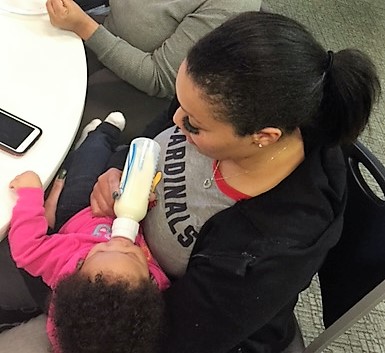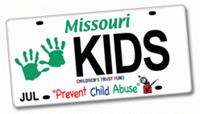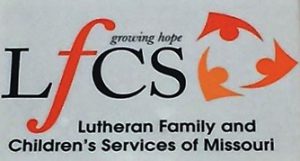
www.lfcsmo.org
LFCS has been a huge blessing for me and my little family through the good and bad. – Resource Parents Participant
On a Thursday evening, a group of nearly fifteen young parents and their children met at a local church for a pizza dinner together and to visit, catch up with one another and socialize. Soon after their children were scurried off to the play area, they got down to business. Circled around in chairs, Erin Maynard of Lutheran 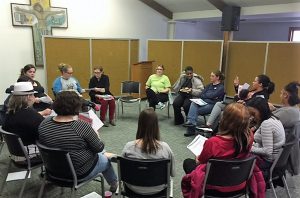 Family & Children’s Services, led a discussion about modeling positive reinforcement. The parents listened intently and were asked to reflect on and share their own parent/child experiences: ‘Say thank you. Say I love you. Listen. Compliment a school project or homework assignment. Be helpful. Don’t be quick to anger. Ask about your child’s day. Smile and be positive.’ These parents were familiar with one another; most had been a part of the group for several years. Over time, they had developed into a friend group providing comfort, support and advice.
Family & Children’s Services, led a discussion about modeling positive reinforcement. The parents listened intently and were asked to reflect on and share their own parent/child experiences: ‘Say thank you. Say I love you. Listen. Compliment a school project or homework assignment. Be helpful. Don’t be quick to anger. Ask about your child’s day. Smile and be positive.’ These parents were familiar with one another; most had been a part of the group for several years. Over time, they had developed into a friend group providing comfort, support and advice.
In 2017, the Lutheran Family and Children’s Services (LFCS) served nearly one hundred parents and children through its Resource Parents program using the Nurturing Parents curriculum. Participants are either pregnant and/or parenting, and age 22 years and younger. They meet twice a month for two hours where a meal, childcare, transportation and a licensed clinician are part of the deal. During their time together, they learn about, discuss topics such as protective 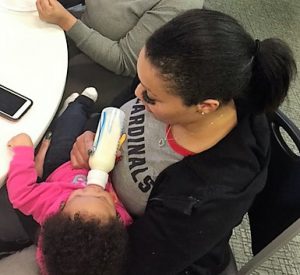 factors, child development, safe sleep, stress, discipline techniques, resilience and budget management.
factors, child development, safe sleep, stress, discipline techniques, resilience and budget management.
“We offer a therapeutic support group where parents experience a sense of belonging and support as they express normal parental frustrations,” said Heather Wall, LFCS Director. “Obviously an unplanned pregnancy is a stressor. Finding yourself pregnant as a teen, alone, living in poverty at a young age and without support causes immediate frustration and stress.” She said Resource Parents focuses on helping young parents access prenatal care, remain in school, successfully complete their high school education or obtain their HISET, develop connections, and build their parenting skills and knowledge, so they can 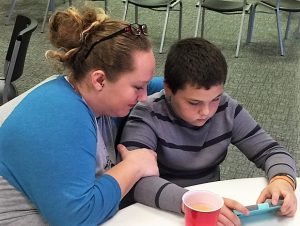 be the best parents they can be while lessening the chances of child abuse and neglect.
be the best parents they can be while lessening the chances of child abuse and neglect.
Hall described a 17-year-old mother who showed amazing resilience. She took everything LFCS offered and excelled. This young mom had struggles, but she did what she needed to do to support her family. She stayed in high school, graduated and continued her education after completing the rigorous process to receive financial aid. She then navigated the system on her own to obtain child care so that she could maintain a job at the VA Hospital.
“When these young moms walk through our door, they are in a tough predicament and are many times at rock bottom. ‘Look at me…I can’t put food on the table. Look at me… I can’t do this. Look at me…I just got pregnant and everyone is mad at me.’ They don’t feel very good about themselves,” Wall said. “LFSC always accepts them where they are in their place. Building relationships allows us to be more direct when sharing information later, and allows the moms to be more accepting of help.”
Wall says it’s a beautiful thing when young moms realize a sense of hope in trusting, learning and connecting with others. During the Resource Parents meeting, one mom complimented another by saying, “You look so much more confident and happier since we first met you. You seem to be in a better place.” The other mom said with a smile, “Yes, I am in a better place. Thank you for noticing.”
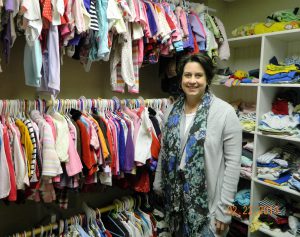
Heather Wall, LFCS Director, shows off the Clothing Boutique.
Teen Parenting
— Teen pregnancy is a risk factor for child abuse.
— Some studies of physical abuse, in particular, reveal that teenage mothers exhibit higher rates of child abuse than older mothers do. Other factors such as lower economic status, lack of social support, and high stress levels contribute to the link between young parents and child abuse. – Child Welfare Information Gateway
Missouri KIDS COUNT Data Book – mokidscount.org
Annie E. Casey Foundation KIDS COUNT Data Book – aecf.org/resources/2018-kids-count-data-book/
Number of births to teens (age 15-19) in 2016:
— 79 in Boone County/10.4 births per 1000 teens
— 4,501 in Missouri/ 23.3 births per 1000 teens
— 209,809 in the United States/20 births per 1000 teens
Promoting Protective Factors for Pregnant & Parenting Teens: A Guide for Practitioners
Building protective factors for pregnant and parenting teens can help them to develop skills, personal characteristics, knowledge, relationships, and opportunities that offset risk factors and contribute to improved well-being.
####

